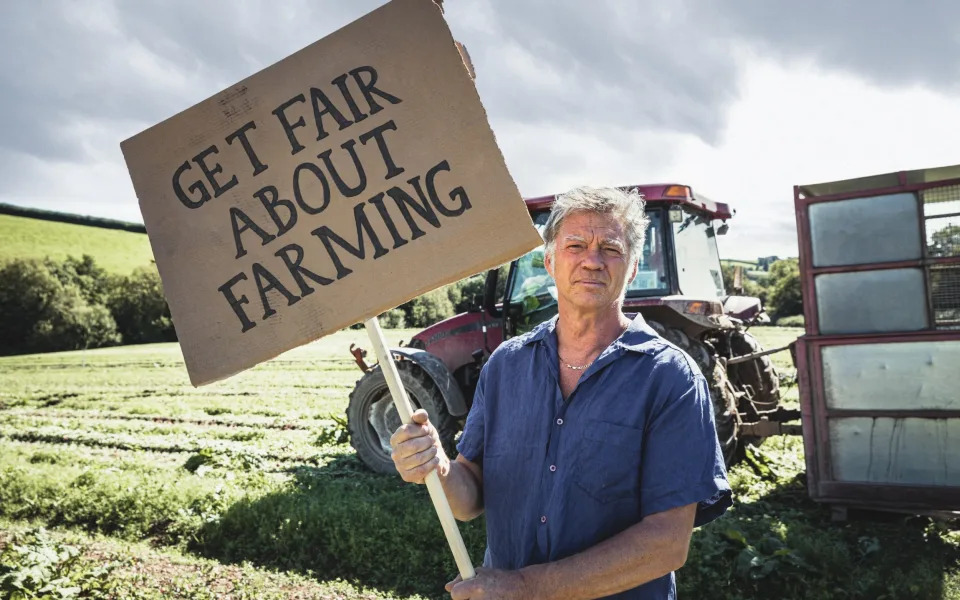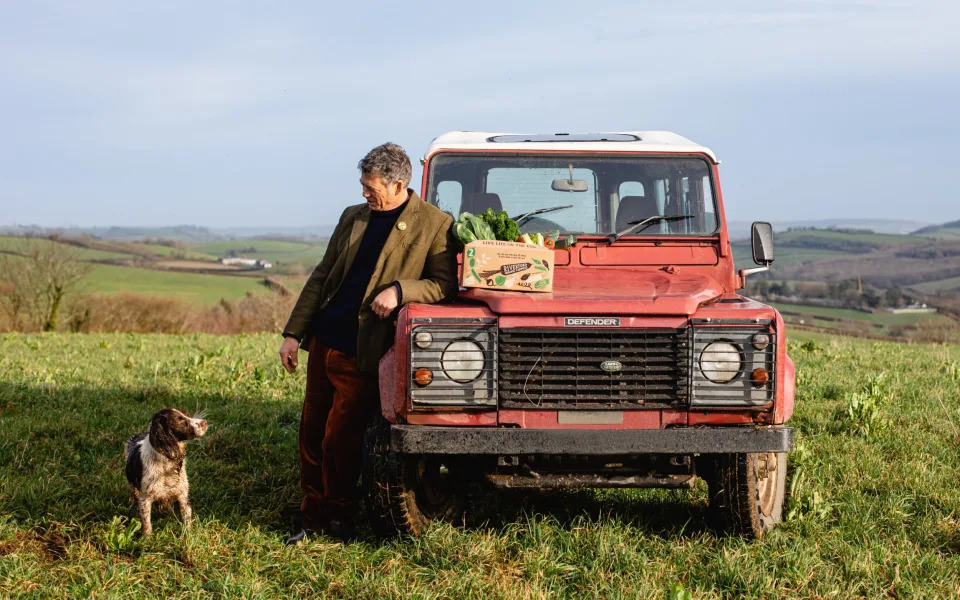‘The Tories’ lack of support for farmers will see them pay at the polls’
Daniel Woolfson
Tue, 24 October 2023

Riverford founder Guy Singh-Watson says there is ‘a huge amount of anger’ in the countryside over the Government’s rural policies - Stuart Everitt
The Tories have squandered the farming vote, the boss of Riverford Organics has claimed.
Guy Singh-Watson, founder and chief executive of Riverford, said there was “a huge amount of anger, frustration” in the countryside over the Government’s rural policies.
Farmers have been left to cope with soaring inflation and deal with the upheaval of the transition from EU subsidies to new green incentives in England, known as the Environmental Land Management schemes (ELMs). The process has been beset by delays and confusion.
Mr Singh-Watson criticised the Government’s handling of the scheme. He said: “Let’s remember, it was only just over 12 months ago, when Liz Truss was talking about tearing [ELMs] up.
“What the hell are we meant to do? What’s the next turn going to be?”
Founded in 1987, Devon-headquartered Riverford Organics supplies 65,000 households with fruit and vegetables from its own organic farms and other producers across the UK. Sales last year were a record £110m.
The criticism from Mr Singh-Watson comes days after a historic wipeout of the Conservatives in by-elections in Tamworth and Mid-Bedfordshire.
The defeats in what were relatively safe seats have led experts to warn that the Tories can no longer rely on traditional strongholds.
Farmers and rural communities have long been seen as a bedrock of support for the Conservatives but backing has wavered in recent years as financial pressures on food producers have mounted.
A survey by Farmers Weekly at the end of last year found just 42pc of farmers would vote for the Tories in a general election. That was the lowest amount on record, down from 71pc in 2020.
Mr Singh-Watson, 63, said: “I don’t think you’ll find any farmer who would defend [their record]. There’s a huge amount of anger, frustration, probably a fair amount of it reflected in the fishing industry as well.”
Earlier this year Jeremy Clarkson summed up rural frustrations when he said farming had become “mainly about filling in forms”.
Mr Singh-Watson said he believed ministers “sold farming down the Swanny” by doing trade deals after Brexit that undermined British producers.
He said: “I remember Michael Gove from the Oxford farming conference saying categorically that farmers had no need to worry about foreign trade deals, and that the standards for imports would be the same as for UK production.
“We can now import eggs from Mexico without any restrictions on how they’re produced at all. Those are directly competitive with British eggs.”

Rural communities have long been seen as a bedrock of support for the Conservatives – but in recent years backing has wavered - Stuart Everitt
Lizzie Hacking, a Conservative councillor and chairman of the Conservative Rural Forum, said a group of MPs were pushing for rural issues to be put “front and centre” ahead of the next election to shore up support.
She said: “They’re recognising the polls haven’t necessarily been where they have been historically, and they’re trying to fix it. The rollout of ELMs has created some frustration, which is fair. I think the party recognises that it’s not been as smooth as it could have been.”
Beyond the ELMs, Mr Singh-Watson highlighted a lack of support from the Government for farmers when dealing with supermarkets.
Supermarket vegetable shortages earlier were blamed on bad weather impacting harvests. However, Mr Singh-Watson said pressure from supermarkets to keep prices low was leaving the country vulnerable to further supply issues.
He said: “Prices are being driven down and down and down... farmers are getting a smaller and smaller proportion of the end retail price.
“What typically happens in negotiations is that the supplier ends up being driven down to something only marginally above their variable costs of production – seed, labour, fertiliser, packaging – but nothing is left over or very little left over for reinvestment in the infrastructure of the farm.”
Riverford has launched a campaign called Get Fair About Farming calling on the Government to intervene by reforming the Groceries Code of Practice, which dictates how retailers treat their suppliers. Over 67,000 people have signed a petition so far.

An open letter accusing supermarkets of ‘wasteful’ practices was signed by celebrities including Hugh Fearnley-Whittingstall - Jeff Gilbert
Mr Singh-Watson said: “If you go to Holland and meet growers, they have confidence in their long-term future. They will put up a greenhouse that won’t be paid off in their lifetime and possibly their children’s lifetime.
“No one’s going to do that if they don’t have confidence in the future. And that will come both through government policy and the way the [supermarket] buyers behave, so we’ve just got a double whammy in this country.”
In an open letter to the bosses of Tesco, Asda, Sainsbury’s, Morrisons, Aldi and Lidl, Riverford accused the supermarkets of “imbalanced, short term and wasteful” practices that have left British farmers “struggling to survive”.
It was signed by celebrities including Hugh Fearnley-Whittingstall, Julia Bradbury and Ray Mears.
Mr Singh-Watson said: “Clearly supermarkets have been making a bloody fortune during Covid and the post-Covid period.”
Supermarkets have faced repeated accusations of profiteering during the cost of living crisis as prices rose. However, the sector was cleared of doing so by the Competition & Markets Authority (CMA) in July, citing a fall in supermarkets’ margins.
Mr Singh-Watson said government support for striking a new deal between supermarkets and farmers would help to boost Britain’s food security.
He said: “In 1980 we were about 80pc self sufficiency in food, we’re now down to about 60pc depending on how you measure it.
“I would like to see us get back up to 80pc, or certainly not fall any lower. And that does require farmers being able to invest in their businesses.”
Andrew Opie, director of food and sustainability at the British Retail Consortium, which represents supermarkets, said: “Food retailers source, and will continue to source, the vast majority of their food from the UK, and work hard to pay a sustainable price to farmers.
“Retailers value their relationships with British farmers and are supporting them by paying more for their produce.
“However, retailers are also facing many additional costs and the recent CMA report shows that they are working hard to absorb these in order to limit price increases for their customers.”
A spokesman for the Department for Environment, Food and Rural Affairs (DEFRA) said: “We back British farmers and are committed to realising the benefits of greater trade, opening up new markets for our world-class British produce.
“We are supporting farming by investing £2.4bn annually into the sector and at our Farm to Fork Summit this year, we announced a package of measures to protect farmers’ interests in future trade deals, boost domestic fruit and veg production and deliver new investment in technologies.”
No comments:
Post a Comment